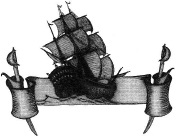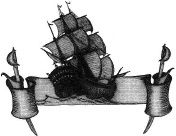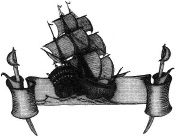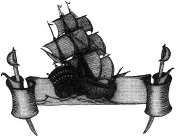Peter and the Shadow Thieves (19 page)
Read Peter and the Shadow Thieves Online
Authors: Dave Barry,Ridley Pearson
Tags: #Juvenile Fiction, #General, #Action & Adventure

Slank frowned, trying to make sense of what he’d seen. The furled sail sagged open, and there it was again.
He quickly lowered himself from the lookout basket, scurried down the rat lines, crossed the deck, and ascended the mizzenmast faster than he’d gone aloft in years. He climbed to the folds in the second sail from the top. He pul ed on the heavy sailcloth, one fold to the next, searching for what he thought he’d seen. Several men gathered on the decks below, watching, wondering what Slank was doing.
There!
Slank reached and held the last of the folds open. He leaned over and peered down into this fold, confused by what he saw: three apple cores, eaten to the seeds; a bone, also gnawed practical y to the marrow.
A
rat? But what rat would climb up here to eat? A bird
?
Slank hooked his knee around a line and lowered himself upside down into the fold of canvas, drawing mutters of interest from the sailors below. He grabbed the bone, then pul ed himself back up. Steadying himself, he studied the bone, twisting it in the gray light.
Teeth marks. Not picked clean by a bird’s beak, as he might have expected. Not the gnawings of a rat, either; no, these looked like human teeth marks, too smal to be a man’s. They were more the size of a…
Slank stared out toward the rooftops of London, then glanced at the decks below. Could their stowaway have left these behind? But the apple cores were not nearly rotten enough; they were far too fresh, too recently eaten. The stowaway had jumped ship weeks ago.
Slank frowned, remembering another ship and the boy who’d gone overboard at sea—only to reappear later, alive. He thought about the rumors of a ghost haunting the ship
—
after
the stowaway had gone overboard.
Could it possibly be
?
Slank stared at the bone, his grip tightening on it, as he would love to have squeezed the throat of the flying boy. If, somehow, the boy had been on the ship, and was now here in London, what did that mean for Ombra and his plan? Did Slank dare mention it? Back on the island, Ombra had cautioned him about his hatred for—his obsession with—the boy. Did he dare bring up his suspicions now, without better proof than some old bone and some apple cores? Yet Ombra himself had clearly suspected something was amiss on the ship, with his constant demands for searchers and extra guards….
Slank decided that, for the time being, he would keep his suspicion to himself. He pocketed the bone and climbed back down to the deck, inventing a story to explain his unusual behavior to the watching sailors.
Yes, he’d keep quiet for now. But when he got off the ship—as he would soon enough, he’d be looking for the boy. And if he found him…
Slank put his hand into his pocket again and gripped the bone until it snapped.

SOMEHOW
P
ETER, WITH TINK STILL unhappily concealed under his shirt, stumbled from the aley into a cobblestone street swarming with activity. In the center of the street, barrels and crates were being hauled by horse-drawn wagons, as wel as handcarts pushed and pul ed by grunting, cursing men. Hurrying this way and that were sailors of many hues, in many garbs, talking and shouting in many languages. Everybody seemed to be in a hurry; everybody seemed to be in everybody else’s way.
On both sides of the street, next to gutters running with stinking brown water, were shops sel ing clocks, sextants, canvas trousers, weatherproof coats, hammocks, rope, lanterns—al manner of goods for ships and those who sailed them. Scattered among the shops were public houses, from which came the sounds of shouting, singing, laughter, and fighting. Directly across the street from Peter, a sailor in a red flannel shirt emerged from a pub, stood for a moment, wavering back and forth, and then pitched face-forward into the gutter. Nobody took notice; the din and flow of humanity went on around him unabated.
An official-looking man strode past, wearing a blue jacket with brass buttons.
“Excuse me, sir,” Peter said, stepping up to him, “can you tel me where I might find Lord—”
“Out of the way!” said the man, barely looking down as he gave Peter a shove that sent him stumbling into another man, who shoved him into yet another man, who cuffed him on the ear and pushed him away so hard that he fel into the street and had to scuttle backward like a crab to avoid being trampled by a horse pul ing a wagon.
Peter leaped to his feet and pressed his wet back against a building, his heart pounding. Tink’s bel s sounded angrily from under his shirt.
“We
can’t
fly away,” he whispered. “People don’t fly in London.”
But we can fly,
she said.
“But not here. I don’t want them to see me,” Peter whispered. A chil swept through his body, and he shivered violently. He was wet and filthy, and his feet were bare. Suddenly he became acutely aware of how cold and hungry and tired he was. Especial y cold.
And night was fal ing.
Despair seeped into Peter’s soul. He longed to be back on the island with the Lost Boys. For a moment he wanted only to sink to the ground, curl into a bal , and cry. What prevented him from doing so was the thought of Mol y, and the memory of the time she had leaped from a ship in the middle of the ocean to save his life. If
he
were in trouble, she would not lie on the ground sniveling; she would find a way to help him. Now she was in trouble, somewhere in this indifferent, confusing, and cruel city. And somehow he had to find her.
Somehow.

A TINY HEART BEATING
T
WO MILES AWAY, in her grand home on Kensington Palace Gardens, Moly paced in her room, as she had done for much of a lonely, restless afternoon. She paused every few minutes to look out the window—for what, she didn’t know.
Each time she looked, the scene was the same: the street, the gloom, Mr. Cadigan standing guard. Nothing changed. Yet stil Mol y was drawn back to the window, time and again.
She sat on her bed, then stood again, then sat, then lay down for perhaps the dozenth time, knowing that rest would not come.
Al at once she felt a burning at the base of her neck. She quickly unbuttoned the top two buttons of her blue-and-white dress and felt for the locket that hung around her neck.
It was warm.
Mol y ran to her window. A hard rain poured down. She looked down onto the broad street in front of the house, but the rain fel too heavily to al ow her to see across to the mansion on the other side. Despite herself, she dared to hope that she would see her father’s coach arriving, or even her father himself already at the front door.
But there was only Mr. Cadigan, at his post.
Staring out her window, she pul ed the locket out from under her dress. It pulsed twice, like a tiny heart beating.

A FEELING
P
ETER GASPED, AND his hand went to the locket around his neck.
What is it
? said Tink, who had felt it also, the sudden warmth.
What’s happening
?
“I don’t know,” whispered Peter, touching the locket, feeling it pulse twice. He held it for a moment, not daring to pul it out on this busy street. Then he let it go and pushed himself away from the wal . Hunching his shoulders against the cold, he started walking purposeful y uphil , away from the water, toward the smoky density of London.
Where are we going
? asked Tink, from under his shirt.
“To find Mol y,” said Peter.
But you don’t know where she is.
“No,” said Peter. “I don’t. But I know she’s here.”

A WAY OUT
A
S THE GRAY DRIZZLE of evening sky turned to the murky dark of night, Peter trudged through mud-slick streets, his feet bleeding from cuts he was too cold to feel.
It would be inadequate to say that he was lost, since he’d never known where he was, or where he was going. No, he was far beyond lost. He tried to keep aimed in one direction—away from the river—but the cobblestone streets were a maze, twisting this way and that, sometimes branching off in four or five directions, sometimes stopping in a dead end, forcing Peter to retrace his weary steps. He could have been miles from where he started; he could have been only yards. He simply didn’t know.
As night fel , the streets grew less busy. But they were not deserted: Peter encountered other shadowy shapes moving through the fog. Most of them, especial y the women and children, scurried past, keeping their distance, their eyes avoiding Peter’s. But some of the men and larger boys slowed and gave Peter hard, appraising looks, looks that made him hold his breath and tense his legs, ready to run.
Peter was working his way along a dark, narrow stretch of street when Tinker Bel , under his shirt, emitted a sharp warning sound an instant before Peter sensed something moving to his left. He jumped away from it, an action that saved him; for at that moment, a dark form lunged at him from a pitch-black al ey. Peter felt a hand brush his back, the fingers grasping his shirt, trying to get a grip. Peter scrambled forward, jerking free, almost fal ing, catching himself with his hands on the ground as he stumbled away, hearing a grunt and a curse behind him, then the sound of heavy footsteps right behind.
Upright again, Peter raced blindly through the fog, hearing the hard clomping fol owing him. On and on he ran until, final y, the sound began to fade. Peter came to a cross street, where he turned right and kept running until he could no longer hear the footsteps at al . He final y came to a stop, breathing hard, near a gas streetlight that infused the fog with a ghostly glow.
“Thanks, Tink,” he gasped.
Why didn’t you fly
? she demanded.
“I’m attracting too much attention as it is,” he said. “If people see me fly, word wil spread that there’s a flying boy in London, and Slank and the others could figure out that I’m here. Besides, I got away, didn’t I?”
Tink, unable to come up with a counterargument, changed the subject.
I want to get out,
she said.
It smells awful in here.
“Not yet,” he said. “We can’t—”
“Who’re you talking to?” came a voice from behind him.
